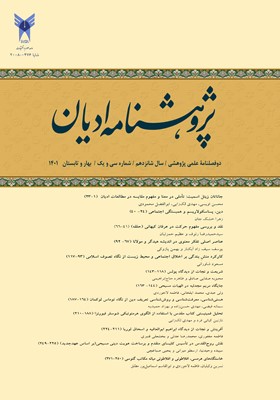هستیشناسی، معرفتشناسی و روششناسی تعریف دین از نگاه توماس لوکمان
محورهای موضوعی : مسیحیتسمانه فیضی 1 , مهدی حسن زاده 2 * , بهزاد حمیدیه 3 , منصور معتمدی 4
1 - دانشجوی دکتری ادیان و عرفان تطبیقی، دانشگاه فردوسی مشهد، مشهد، ایران
2 - دانشیار، گروه ادیان وعرفان تطبیقی، دانشگاه فردوسی مشهد، مشهد، ایران
3 - استادیار،گروه ادیان و عرفان تطبیقی دانشگاه تهران، تهران، ایران
4 - دانشیار گروه ادیان و عرفان دانشگاه فردوسی مشهد
کلید واژه: توماس لوکمان, تعریف دین, هستیشناسی, معرفتشناسی, روششناسی,
چکیده مقاله :
لوکمان دین را نظامی معنایی تعریف می کند که انسان را از ماهیت بیولوژیک خود فراتر برده و به کنشگر صحنه ی اجتماعی تبدیل می کند. از آنجاکه درک مبانی فلسفی علم برای فهم و تفسیر دقیق نظریه ها و نتایج پژوهش مهم است و بنیان اندیشه ی محقق و میزان انسجام نظریه او را روشن میکند، در نوشتار حاضر مبانی هستیشناختی، معرفت شناختی و روش شناختی این تعریف بررسی شده است. لوکمان در هستی شناسی موضعی بینابین دارد؛ در این که دین در رابطه بیناذهنی افراد به وجود می آید برساخت گرا و در این که به عنوان نهاد، قدرت کنترل اجتماعی دارد واقعگرا به نظر میرسد. او در معرفتشناسی و روش شناسی، برساختگرا است و معتقد است پدیدارشناسی رهیافتی است که می تواند چارچوبی برای درک مفاهیم و اندازهگیری واقعیت اجتماعی از موضع برساخت گرا به دست بدهد اما در روش میان جامعه شناسی به عنوان علم و پدیدارشناسی به عنوان فلسفه تمایز می نهد و پدیدارشناسی را هم چون زمینه نظری برای اندیشه خویش به کار می گیرد.
Luckmann defines religion as a meaning system that transcends man from his biological nature to become actor of the social scene. Since understanding the philosophical foundations of science is important for understanding and interpreting theories and research results accurately and clarifies the basis of the researcher's thought and coherence of his theory, in this paper the ontological, epistemological and methodological foundations this definition has been investigated. Luckmann has an intermediate position in ontology; he seems to be realistic in that religion arises in the intersubjective relationship of individuals, and has the power of social control as an institution. In epistemology and methodology, he is constructivist; believes that phenomenology is an approach can provide a framework for understanding the concepts and measuring social reality from a constructivist standpoint. But in method, he distinguishes between sociology as science and phenomenology as philosophy, and uses phenomenology as a theoretical context for his thought.
ـ برگر، پیتر و لوکمان، توماس (1375). ساخت اجتماعی واقعیت: رسالهای در جامعهشناسی شناخت، مترجم: فریبرز مجیدی، تهران، علمی فرهنگی.
- Berger, Peter L& Luckman, Thomas (1955). Modernity, Pluralism and the Crisis of Meaning, The Orientation of Modern Man. Translated: Tooze, J. Adam, Bertelsmann Foundation Pubs.
- Blaikie, Norman & Priest, Jan (2018). Designing Social Research: The Logic of Anticipation. Cambridge, Polity Press.
- Bryman, Alan (2012). Social Research Methods, Oxford University Press.
- Crotty, Michael (1998). The Foundations of Social Research, Meaning and Perspective in the Research Process, London, Sage Publication.
- Durkheim, Emile (1912). The Elementary Forms of the Religious Life, New York, The Free Press.
- Epstein, Brian, Social Ontology, in: Stanford encyclopedia of Philosophy, Wed Mar 21, 2018, (https://plato.stanford.edu/entries/social-ontology/).
- Kenneth, Allan (2005). Explorations in classical Sociological Theory. London, Pine Forge Press.
- Luckmann, Thomas, (2013). “Ontological Realism and the Social Construction of Reality”, Bulletin of Yerevan University F: Sociology, 4(1), 3-8.
- _______________, (2008). “On Social Interaction and the Communicative Construction of Personal Identity”, Knowledge and Reality, Organization Studies, 29(2), 277-290.
- ______________, (2001). The Social Forms of Religion in Western Societies at the End of the Twentieth Century, in: Cruttie, Furrio & Ragionieri, Rodolfo, Identities and Conflicts the Mediterranean, Macmillan, Palgrave.
- _______________, (1989). “On Meaning in Everyday Life and in Sociology”, Current Sociology, 37(17), 17-20.
- _______________, (1983). Philosophy, Science and Everyday Life, in: Luckmann, Thomas, Life-world and Social Realities, London, Heinemann.
- _______________, (1977). “Theories of Religion and Social Change”, in: The Annual Review of the Social Sciences of Religion, 1(1), 1-28.
- _____________, (1976). The Invisible Religion: The Problem of Religion in Moedern Societies, New York, MacMillan.
- ______________, (1963). “On Religion in Modern Society: Individual Consciousness, World View, Institution”, Journal for the Scientific Study of Religion, 2(2), 147-162.
- _____________ & Berger, Peter, (1966). “Secularization and Pluralism”, International Yearbook for Sociology of Religion, Köln, Opladen.
- Marsh, David; Furlong, Paul, (2010). A skin not a sweater: ontology and epistemology in political science, in: Theory and Methods in Political Science, Macmillan, Palgrave.
- Moon, Katie; Blackman, Deborah, (2014). A Guide to Understanding Social Science Research for Natural Scientists, Conservation Biology, 28(5), 167-177.
- Moses, J. W., T. Knutsen, (2010). Ways of knowing: competing methodologies in social and political research, Macmillan, Palgrave.
- Neuman, W. Lawrence (2014). Social Research Methods: Qualitative and Quantitative Approaches, UK, Pearson Ltd.
- Outhwaite, William; Turner, p. Stephen, (2007). The Sage Handbook of Social Science Methodology, London, Sage Publication.
- Schutz, Alfred (1967). The Phenomenology of the Social World, translated: G. Walsh, F. Klehnert, Evanston, Northwestern University Press.
- __________ (1976). Fragments on the Phenomenology of Music, in: F. J. Smith (ed.) In Search of Musical Method, London: Gordon and Breach Science Publishers.
- Weber, Max (1991). The Nature of Social Action, in: Runciman, W.G. Weber: Selections in Translation, Cambridge University Press.
- Weber, Max (1964). The Theory of Social and Economic Organization, translated: Henderson, A.M; Parsons, Talcott, New York, The Free Press & The Falcon’s Wings Press.
_||_
